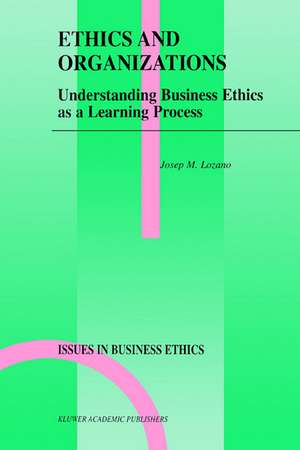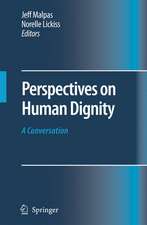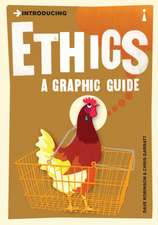Ethics and Organizations: Understanding Business Ethics as a Learning Process: Issues in Business Ethics, cartea 15
Autor Josep M. Lozanoen Limba Engleză Paperback – 30 noi 2001
| Toate formatele și edițiile | Preț | Express |
|---|---|---|
| Paperback (1) | 635.96 lei 6-8 săpt. | |
| SPRINGER NETHERLANDS – 30 noi 2001 | 635.96 lei 6-8 săpt. | |
| Hardback (1) | 640.88 lei 6-8 săpt. | |
| SPRINGER NETHERLANDS – 31 aug 2000 | 640.88 lei 6-8 săpt. |
Din seria Issues in Business Ethics
- 17%
 Preț: 364.74 lei
Preț: 364.74 lei -
 Preț: 420.97 lei
Preț: 420.97 lei - 15%
 Preț: 527.48 lei
Preț: 527.48 lei - 15%
 Preț: 644.63 lei
Preț: 644.63 lei -
 Preț: 385.84 lei
Preț: 385.84 lei - 15%
 Preț: 730.86 lei
Preț: 730.86 lei - 20%
 Preț: 517.09 lei
Preț: 517.09 lei - 15%
 Preț: 598.50 lei
Preț: 598.50 lei - 15%
 Preț: 645.60 lei
Preț: 645.60 lei - 18%
 Preț: 1220.88 lei
Preț: 1220.88 lei - 18%
 Preț: 953.03 lei
Preț: 953.03 lei - 15%
 Preț: 643.99 lei
Preț: 643.99 lei - 15%
 Preț: 644.82 lei
Preț: 644.82 lei - 15%
 Preț: 639.73 lei
Preț: 639.73 lei - 20%
 Preț: 558.32 lei
Preț: 558.32 lei - 15%
 Preț: 640.55 lei
Preț: 640.55 lei - 15%
 Preț: 644.49 lei
Preț: 644.49 lei - 18%
 Preț: 772.93 lei
Preț: 772.93 lei - 15%
 Preț: 637.59 lei
Preț: 637.59 lei - 15%
 Preț: 643.99 lei
Preț: 643.99 lei - 15%
 Preț: 644.82 lei
Preț: 644.82 lei - 15%
 Preț: 700.61 lei
Preț: 700.61 lei - 5%
 Preț: 1098.27 lei
Preț: 1098.27 lei - 15%
 Preț: 646.43 lei
Preț: 646.43 lei - 15%
 Preț: 643.99 lei
Preț: 643.99 lei - 18%
 Preț: 952.89 lei
Preț: 952.89 lei - 15%
 Preț: 641.38 lei
Preț: 641.38 lei
Preț: 635.96 lei
Preț vechi: 748.20 lei
-15% Nou
Puncte Express: 954
Preț estimativ în valută:
121.69€ • 127.40$ • 100.69£
121.69€ • 127.40$ • 100.69£
Carte tipărită la comandă
Livrare economică 05-19 aprilie
Preluare comenzi: 021 569.72.76
Specificații
ISBN-13: 9781402003622
ISBN-10: 1402003625
Pagini: 204
Ilustrații: VIII, 192 p.
Dimensiuni: 155 x 235 x 11 mm
Greutate: 0.3 kg
Ediția:Softcover reprint of the original 1st ed. 2000
Editura: SPRINGER NETHERLANDS
Colecția Springer
Seria Issues in Business Ethics
Locul publicării:Dordrecht, Netherlands
ISBN-10: 1402003625
Pagini: 204
Ilustrații: VIII, 192 p.
Dimensiuni: 155 x 235 x 11 mm
Greutate: 0.3 kg
Ediția:Softcover reprint of the original 1st ed. 2000
Editura: SPRINGER NETHERLANDS
Colecția Springer
Seria Issues in Business Ethics
Locul publicării:Dordrecht, Netherlands
Public țintă
ResearchCuprins
0. Introduction: like oil and water?.- 1. Business ethics as applied ethics.- 1.1. BE: a case of applied ethics?.- 1.2. BE as “applied” ethics: a preliminary proposal for integration.- 2. Business ethics: an on-going process.- 2.1. Introduction: a progressive Self-awareness.- 2.2. A first historical approach to BE.- 2.3. The recent development of BE in Europe.- 2.4. What issues should BE address?.- 2.5. BE: a first attempt at a systematic ordering.- 2.6. The acceptance or rejection of BE as a possible (il)legitimization of predominant practices and values.- 2.7.The impossible dissolution of BE in individual ethics.- 2.8. The ethics of organizations as the core of BE.- 3. BE’s self-awareness: unresolved tension and a call for integration.- 3.1. BE: one discipline or two?.- 3.2. Managers’ moral reasoning as a metaphor for and expression of the problem.- 3.3. Integration in the framework of BE: a demand -at least-acknowledged.- 3.4. Beyond ethics as a toolbox.- 3.5. A note about civic ethics as a possible framework for BE.- 4. An illustrative debate: corporate social responsibility.- 4.1. Introduction.- 4.2. A preliminary question: Is the corporation a moral subject?.- 4.3. Corporate social responsibility.- 4.4. Is the corporation in question?.- 4.5. Friedman: the most controversial reference.- 4.6. The diversity of arguments about corporate social responsibility.- 4.7. Corporate social responsibility: a diversity of concepts.- 4.8. The place of corporate social responsibility in the framework of BE.- 5. Stakeholders: who are they and what are their interests?.- 5.1. Power in the corporation, power of the corporation.- 5.2. Stakeholders, an understanding of the corporation.- 5.3. Stakeholders: an analytical classification.- 5.4. Stakeholders: beyond analysis.- 5.5.Stakeholders in an ethics of organizations.- 6. Corporate codes: constructing criteria and goals?.- 6.1. Professional codes as a point of reference.- 6.2. Codes and their ambivalence.- 6.3. Management as a profession: a significant absence.- 6.4. Corporate codes of ethics: a descriptive approach.- 6.5. Codes of ethics: more ethics or more control?.- 7. Corporate cultures: managing values?.- 7.1. Some questions about the concept of organizational culture.- 7.2. Corporate culture and ethics: an ambigous relationship.- 7.3. Ambiguities in the search for excellence.- 7.4. Opening the door to Aristotelian tradition.- 7.5. Final considerations: the outlook for BE.- 8. Integrating ethics in organizations.- 8.1. The paths towards integration: decision-making, a fact or a process?.- 8.2. The paths towards integration: the organization as a project.- 8.3. The paths towards integration: institutionalizing ethics.- 9. Humanization (also) as a process of organizational learning.- 9.1. The emerging knowledge society.- 9.2. Transforming organizational paradigms.- 9.3. An understanding of organizations that includes acknowledging the value of individuals and individuals as value.- 10. The learning organization as the matrix of business ethics.- 10.1. BE’s three “moments” as an organizational learning process.- 11. References.- 12. Index.














